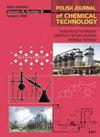通过真空分馏从香茅(Cymbopogon winterianus)油中分离香茅醛和香叶醇:操作条件对分离的影响
IF 1
4区 工程技术
Q4 CHEMISTRY, APPLIED
引用次数: 0
摘要
本研究采用分馏法从香茅(Cymbopogon winterianus)精油中分离香茅醛和香叶醇,以提高其市场价值。采用一次一个因素的方法研究了操作参数的最佳条件和影响,包括系统压力、填料类型和塔高。所有研究均根据其主要馏分香茅醛和香叶醇的含量和回收率进行评估。关于变量的影响,较高的系统压力可以提高分离效果,同时增加各馏分的温度范围和蒸馏时间。填料类型也能提供较大的表面积,从而提高分离效果。最后,色谱柱高度也会对分离产生积极影响。在最佳香茅油分馏过程中,香茅醛含量增加了 2.5 倍,从 37.68% 增加到 94.33%。香叶醇的纯度从最初的 17.33% 提高到 40.61%。蒸馏可回收高达 90.00% 的香茅醛和 68.18% 的香叶醇。本文章由计算机程序翻译,如有差异,请以英文原文为准。
Isolation of citronellal and geraniol from citronella (Cymbopogon winterianus) oil by vacuum fractional distillation: Effect of operating conditions on the separation
This study used fractional distillation to separate citronellal and geraniol from citronella (Cymbopogon winterianus ) essential oil to improve their market value. The one-factor-at-a-time methodology investigated operating parameters’ optimum conditions and effects, including system pressure, packing types, and column height. All investigations were evaluated based on their main fraction’s citronellal and geraniol content and recovery. Regarding the effect of the variables, a higher system pressure improved the separation while increasing the temperature range of each fraction and distillation time. The packing types would also improve the separation by providing a large surface area. Finally, the column height also positively impacted the separation. In the optimum citronella oil fractionation, citronellal content experienced a 2.5-fold increase, from 37.68% to 94.33%. Geraniol purity reached 40.61% from an initial content of 17.33% in the raw CW oil. The distillation could recover up to 90.00% of citronellal and 68.18% of geraniol.
求助全文
通过发布文献求助,成功后即可免费获取论文全文。
去求助
来源期刊

Polish Journal of Chemical Technology
CHEMISTRY, APPLIED-ENGINEERING, CHEMICAL
CiteScore
1.70
自引率
10.00%
发文量
22
审稿时长
4.5 months
期刊介绍:
Polish Journal of Chemical Technology is a peer-reviewed, international journal devoted to fundamental and applied chemistry, as well as chemical engineering and biotechnology research. It has a very broad scope but favors interdisciplinary research that bring chemical technology together with other disciplines. All authors receive very fast and comprehensive peer-review. Additionally, every published article is promoted to researchers working in the same field.
 求助内容:
求助内容: 应助结果提醒方式:
应助结果提醒方式:


